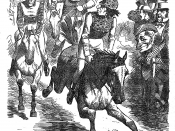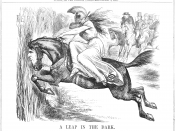Examine the development of elementary education 1833 - 1914 in terms of its economic, social and political aspects.
Enclosure, industrialisation and population growth during the early nineteenth century contributed to enormous social, economic and political changes in Britain. The government, faced with complex new challenges, was under pressure to reform - for example, to provide free, compulsory, state-controlled education, which was already provided in some European countries. However, the dominant force in British politics, the Tories, were fearful of the social consequences of providing the masses with an education and were unwilling to pay for it. The prevailing attitude of laissez-faire, the distrust of state interference and the general opinion that education was best left to the church meant that elementary education was left entirely to voluntary organisations such as Charity schools and the two rival Religious societies, Joseph Lancaster's non-conformist 'British and Foreign Schools Society' (initially formed in 1808) and the Church of England's 'National Society for the Education of the Poor in the Principles of the Established Church' (set up in competition in 1811).
The non-conformist 'British Schools', supported by Samuel Whitbread, William Wilberforce and other reformists, played a major part in the provision of education but it was the National Society that was most successful during this period, not surprisingly as it was supported by the Anglican Church which benefited from the tithe (a form of tax paid to the church) while the other organisations relied upon charity. However, there were insufficient resources to provide every child with an elementary education. The Select Committee on the Education of the Lower Orders in the Metropolis, 1816-1818, reported that:
"a very great deficiency exists in the means of educating the poor" (cited in Taylor, 1988:280)
Whigs (reformists) believed that greater state involvement was required but economically, children were...


